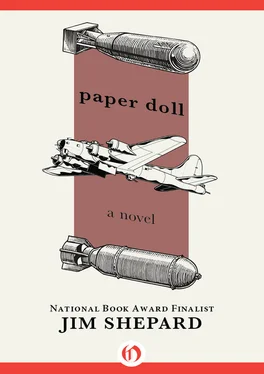They sipped a while in silence. Lewis’s nose was bleeding, and he was stanching it with a bar napkin.
“Nazis can fly , can’t they?” Snowberry said. It was the first mention of the morning. Bryant agreed he’d seen some awfully great flying.
“Except that we don’t want them flying,” Lewis said, napkin to his nose. “We want them dead.”
Bryant felt himself blushing. He glanced at Lewis but couldn’t tell if he’d been referring to Bryant’s lateness in firing during the first attacks.
“We gave ’em a little something to think about,” Piacenti said.
Lewis snorted. “If that’s so, they’re thinking with big grins on their faces,” he said.
Bryant stood up. He was frightened and ashamed of his performance. “You know, Lewis, we’re really getting tired of your negative attitude,” he said. “You don’t think we have a chance, fine. You don’t have any ambition, fine.”
Lewis took the napkin away from his nose. The blood had formed a bright red oval. “My ambition,” he said, “is to die in my spare time. My ambition is to get something useful into your head so you won’t die the know-nothing asshole you are now.”
Bryant was shaking. “I’ll be outside,” he said.
“Just great, asshole,” Lewis said. He reached for his beer. “I’ll be in here.”
Bryant stormed out and paced the street in front of the bar, rehearsing what would occur when Lewis emerged. It began to drizzle, and he stood under an overhang. After half an hour he weighed going back in, and decided he had more pride than that, and began the long walk alone back to the base.
When Snowberry finally came in that night, Bryant asked what had happened after he left, and Snowberry related that they’d had a smash ’em up game of pub bowling, using the pint glasses, and had mucked it up with some of the locals. Even Bean had pitched in, although he’d been more or less forced to. He sighed happily, and Bryant again was aware of being left out. “You shoulda been there,” Snowberry murmured. “We are beyond a doubt the most destructive group of young men in history, in or out of pubs.”
“Did he say anything about my not coming back?” Bryant whispered in the dark. “Gordon.” But Snowberry was asleep on his back with his mouth open, snoring, and from a nearby bunk Lambert Ball grumbled that God, it was like sleeping in a stockyard.
Bryant spent the next morning going over Paper Doll with Tuliese and after lunch settled under the wing to read letters. Lewis had not spoken to him since the night before and he found himself overaware of any movement to or from the Nissen huts.
Piacenti and Ball were fencing with the detached whip antennas from two jeeps. They called En garde! and made gruesome stabbing noises. Bryant ignored them and they went on with their stamping and lunging.
A letter from Robin had come the day of the mission and V-mail from Lois had come that morning. In addition there was a letter from the village that he didn’t recognize. He thrilled a bit to the notion of a secret admirer and opened that one first.
Dear Sergeant Robert Bryant ,
I hope this letter reaches you as it represents my regards. My mother suggested I might write you and thank you for your gift of gum and send support for your difficult task which we are all in together. I sincerely hope you are well and have not been hurt by German action.
Yours ,
Colin Best.
On the back of the envelope Colin had drawn a bulbous B-17 with overprominent gun positions, all unerringly spitting dotted lines out to broken and tumbling smaller planes marked with black crosses. From one a stick figure with a pumpkin head fell spread-eagled and grimacing. Happy Shooting! it said underneath.
He sniffed Robin’s letter. It smelled like paper. He opened it. She had compressed her penmanship carefully, to fit more on the page.
Dear Bobby ,
Eight a.m. in the damp garden this morning I innocently happened upon eight ravaged gooseberry bushes. In a strange way the sight was frightening. They had been gnawed bare and completely stripped, leaving only branches budding leaf skeletons. What a sight! — like a cartoon post-locust scene. Only twelve hours earlier, or less, the bushes had been healthy, leaved, and berried. We’re at a loss. Birds? They don’t eat the leaves and pips (they had stripped every cherry from the just-ripe cherry tree only the night before last, leaves untouched and messy pips strewn over the stones below). Clearly this unknown gooseberry lover had an appetite — the odd remaining leaf actually seemed to show teeth marks.
Other things. Mrs. H (the retired gardening expert I spoke of) was feeling down the other night — no word of a missing son in Africa — so I suggested a country walk. “I do so love the country,” she said. We walked for perhaps an hour, randomly, round unexplored areas just outside the village. We walked past great expanses of watercress growing in shallow flooded beds. She talked about how she missed her Derek and I talked about you. We walked past trimmed hedgerows, some sleepy sheep, big manors I suggested we’d one day have as our own. I could see she was very curious about Americans but reluctant to ask. She said that she had heard Americans were quite uncontrollable in public places but that she imagined a good deal of that was just talk and that she felt sure my young man would hardly be — and here she looked for the word — a cowboy. I told her how we had met, of your graciousness and our talk concerning the usefulness of the Red Cross. She asked if you were very free with gifts and I said you were generous but not like some. I told her as well that you might have the opportunity to meet.
Will we? Will you be able to arrange the leave? Write or ring up when you can. Mother says she’ll be the strictest of chaperones but I have plotted walks and activities certain to drive her back to her garden. Do you like to swim?
Robin.
He reread the letter, folded it crookedly back into its envelope, and opened the half-sized V-mail from Lois. Boy, what a Class A rat, he thought. He felt harder and pleasingly more like a soldier.
V-mail was photographed and reduced to save space and weight, and Lois had taped a factory newsletter over half her sheet. It was The Minesweeper , out of Groton, Connecticut. He frowned. What was she doing in Groton, Connecticut? The title was surrounded by anchor chains and the words Let’s Win an “E” in ’43. She had written over the top margin, Mama, what did you do in the war? Were you a Wave or a Waac? No, dear, I just hid things for other people to find, and found things others had hidden. He didn’t understand at first, and then the newsletter’s title came back to him, and he chuckled. The headline was They Call Her “Frivolous Sal ,” and beneath it were a group of women standing before a clapboard wall, squinting and smiling uncertainly at the camera. There was a thick caption.
Call ’em Frivolous Sal if you care to, but if you do you’re as wrong as Tojo or “that funny little man in the dirty raincoat,” Herr Schicklgruber. The girls pictured above are employed in this yard — in the electrical shop, the copper shop, Navy warehouse and tool rooms. They’re doing their stuff!
Reading from Left to Right: Ilene Reavis, electric shop; Jerrie McManamy, cable room; Naomi Lundgren, electric shop; Betty Kelley, Navy warehouse; Alma Woolridge, copper shop; Dorothy Schnellhardt, copper shop. Second row: Evelyn Everett, electric shop; Joanie Swift, electric warehouse; Irene Erickson, electric shop; Louise Erickson, warehouse; Wilma Jacobsen, machine shop tool room. Third row: Marge Dotts, copper shop; Lois Simon, Navy warehouse; Amanda Duffy, Navy warehouse; Gladys Roeder, tool room; Martine Loomer, copper shop.
Читать дальше












